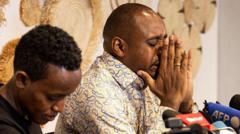Moussa Dadis Camara, once Guinea's military leader, has been pardoned less than a year into his 20-year sentence for crimes against humanity linked to a notorious stadium massacre. This development coincides with the military government's recent announcement of compensatory payments to massacre victims' families, casting a shadow on the pursuit of accountability and reconciliation in the nation.
Former Guinea Leader Receives Pardon Amid Controversial Massacre Legacy

Former Guinea Leader Receives Pardon Amid Controversial Massacre Legacy
The ex-military ruler of Guinea, Moussa Dadis Camara, has been pardoned for his role in a 2009 stadium massacre that left over 150 dead. The decision, attributed to health concerns, raises questions about justice for victims.
Guinea's military junta has made headlines with its recent decision to pardon Moussa Dadis Camara, the country’s former military leader, who was serving a 20-year sentence for crimes against humanity related to a horrifying massacre. The pardon, announced via a state television decree, was reportedly granted on the grounds of health issues.
The tragedy dates back to September 2009 when government troops under Camara's command opened fire on a crowd assembled at a stadium in Conakry advocating for a return to civilian governance. This violent crackdown resulted in the deaths of over 150 individuals, with a further distressing account of numerous women being raped during the chaos.
Camara, who assumed power after the death of long-standing President Lansana Conté in 2008, had fled Guinea shortly after the massacre following an assassination attempt. He returned to the country in 2022 to face the courts, maintaining his innocence throughout the proceedings. In July 2024, Camara was convicted alongside seven military officers after a trial lasting almost two years.
This recent pardon happens against the backdrop of an announcement by Guinea's current military regime to compensate those affected by the massacre. The proposed compensation amounts are significant, with $173,000 earmarked for each rape victim, $115,500 for victims of death or disappearance, and varying amounts for instances of looting and torture.
While the exact health issues faced by the pardoned ex-ruler remain undisclosed, his brother expressed gratitude for the decision, indicating a sense of relief within his family. The military reunion after Camara’s initial departure saw subsequent leaders attempting to steer the country towards stability, a goal jeopardized by the ongoing complexities arising from his past actions.
The broader implications of Camara's pardon are causing unease among human rights advocates and victims' families, who fear that justice is being compromised. As Guinea continues navigating its turbulent political landscape, the interplay between accountability and forgiveness remains a hotly debated topic.



















